人教新目标版英语九年级全Unit 10 You’re supposed to shake hands. Section B 2a-2e 课件(30张PPT)
文档属性
| 名称 | 人教新目标版英语九年级全Unit 10 You’re supposed to shake hands. Section B 2a-2e 课件(30张PPT) |  | |
| 格式 | zip | ||
| 文件大小 | 988.8KB | ||
| 资源类型 | 教案 | ||
| 版本资源 | 人教新目标(Go for it)版 | ||
| 科目 | 英语 | ||
| 更新时间 | 2019-12-12 10:55:47 | ||
图片预览

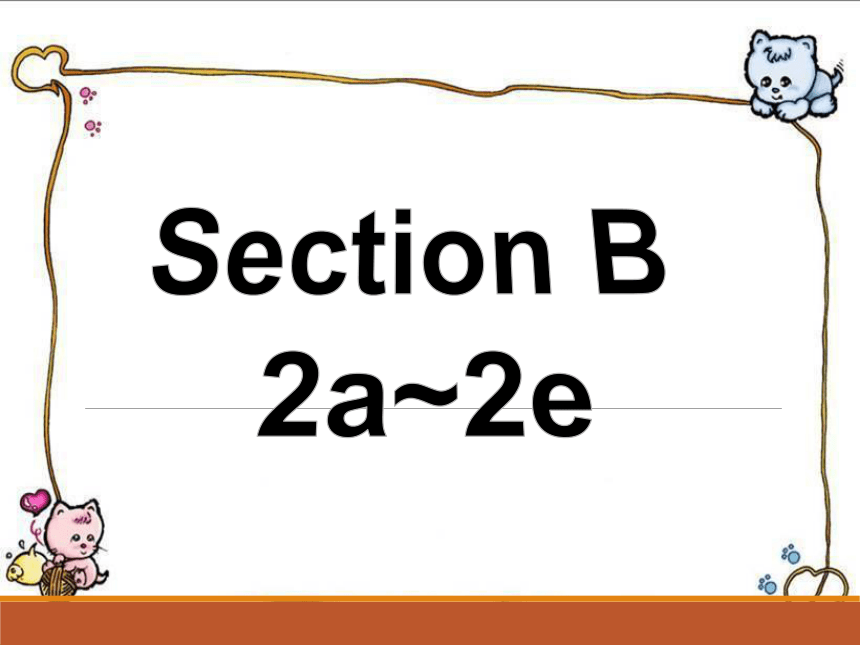
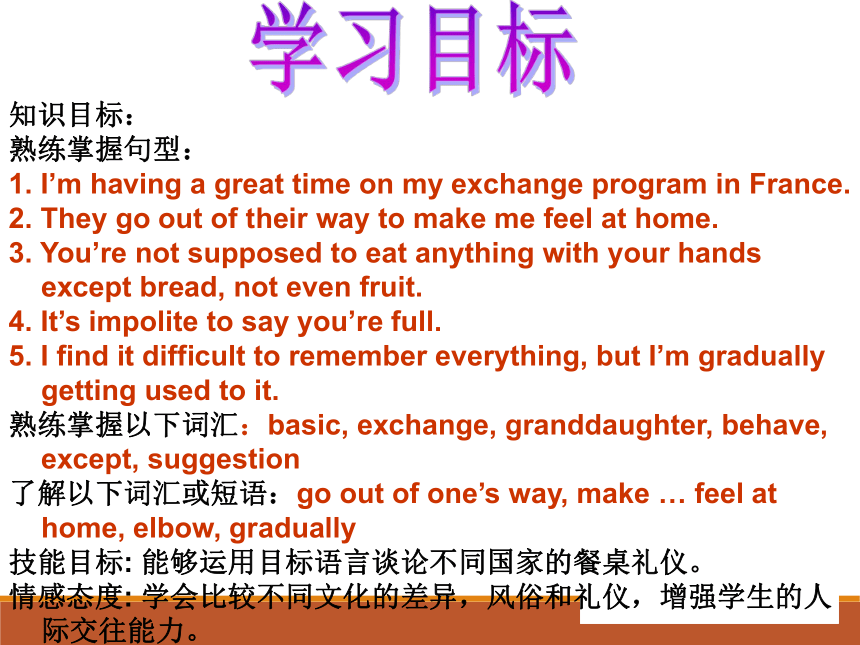

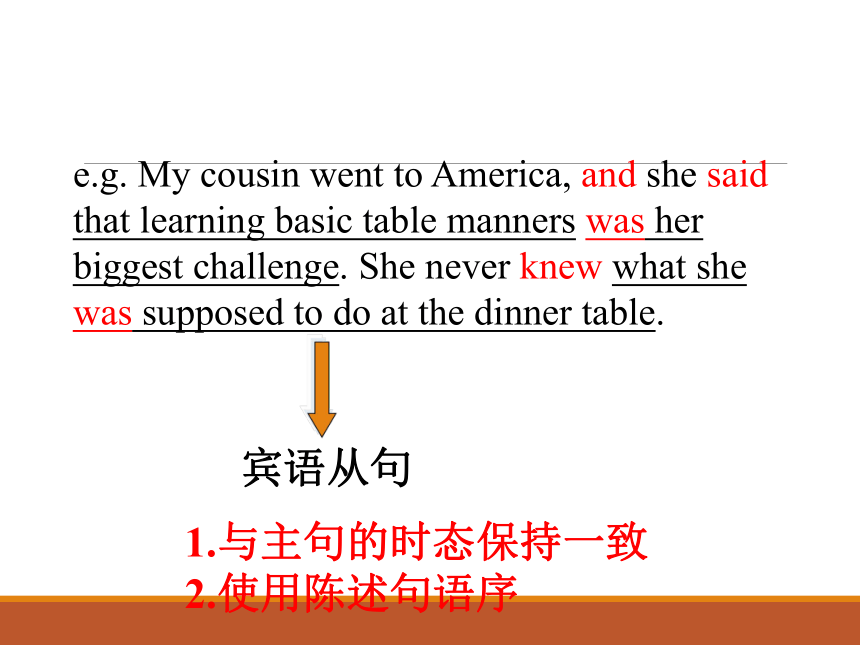
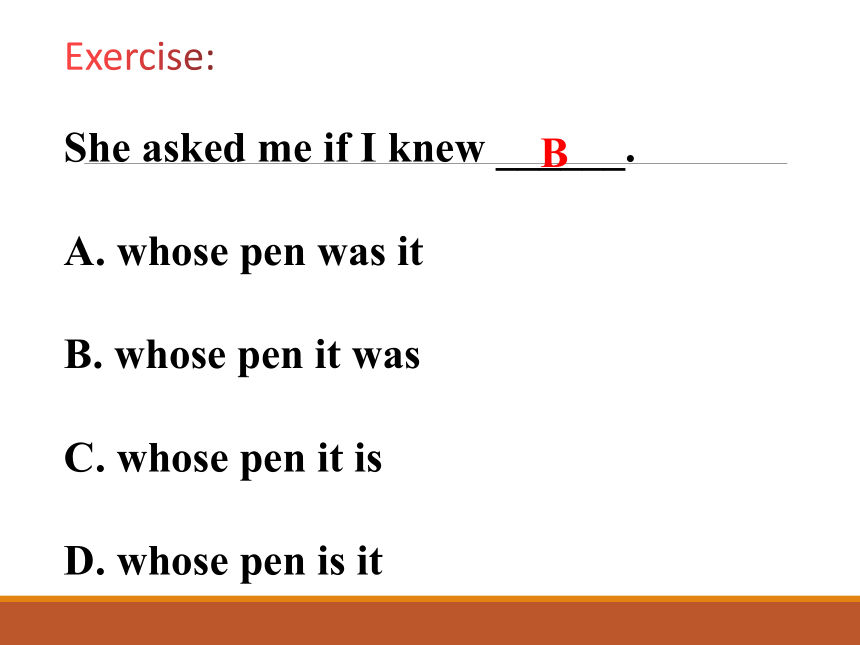
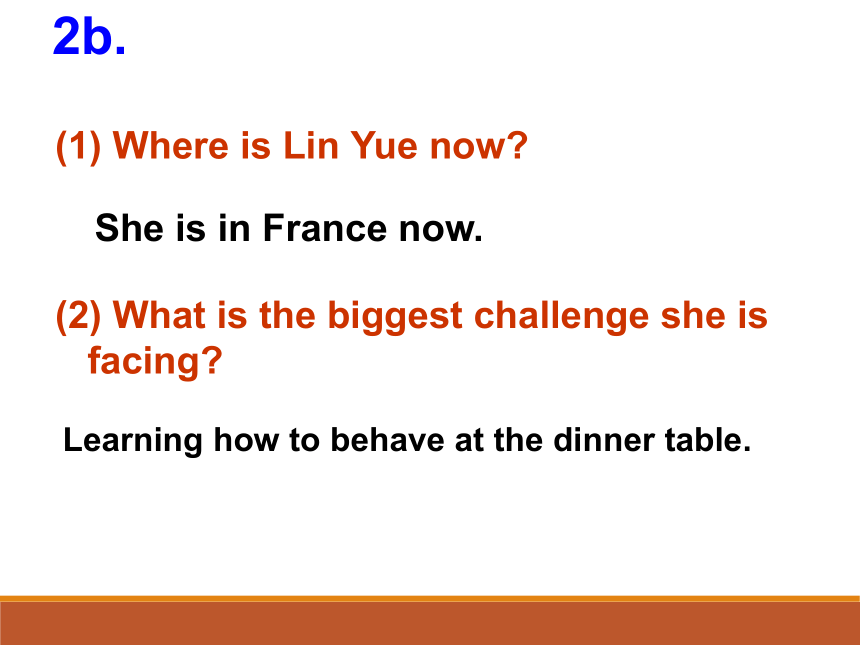
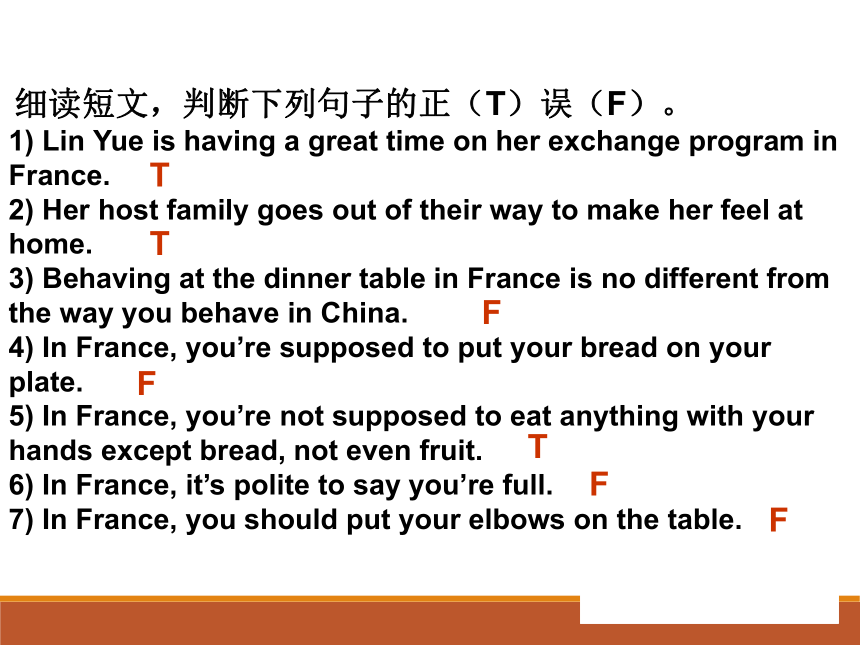
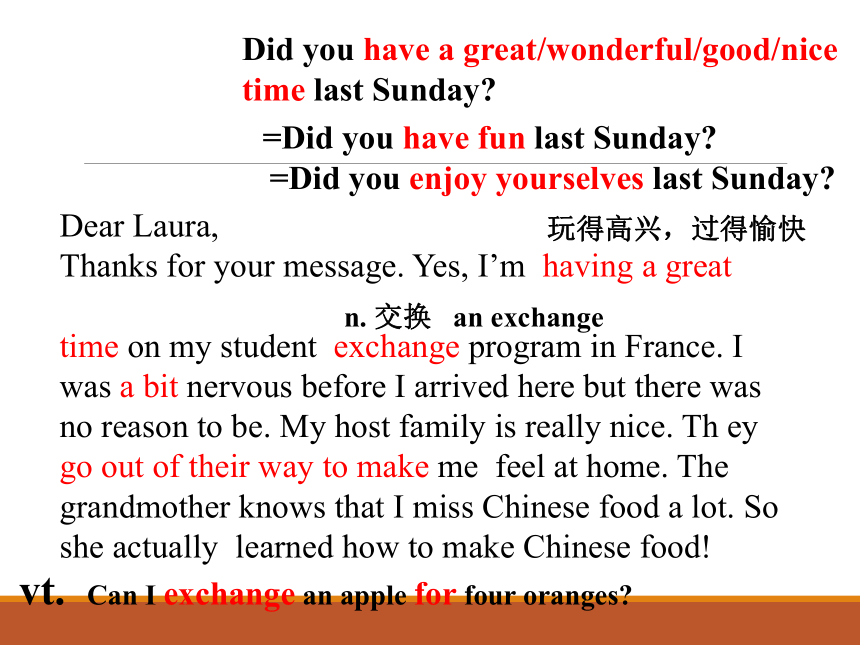
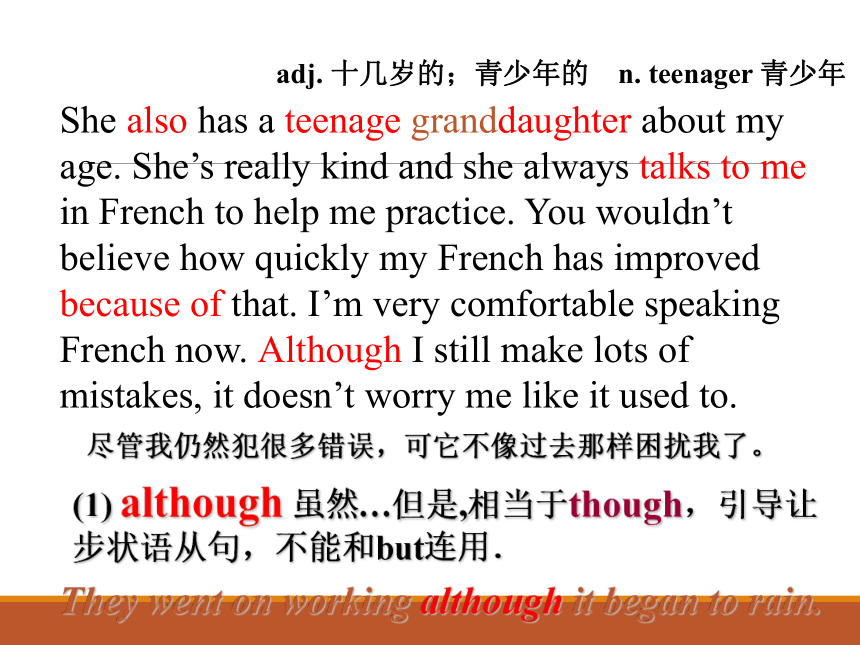

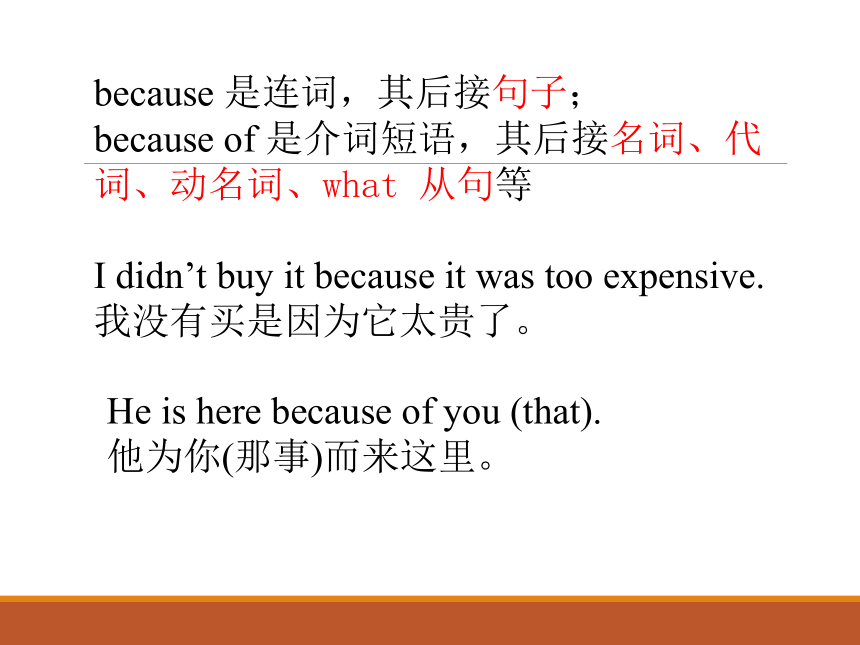
文档简介
(共30张PPT)
Unit 10
You're supposed to shake hands.
Section B
2a~2e
学习目标
知识目标:
熟练掌握句型:
1. I’m having a great time on my exchange program in France.
2. They go out of their way to make me feel at home.
3. You’re not supposed to eat anything with your hands except bread, not even fruit.
4. It’s impolite to say you’re full.
5. I find it difficult to remember everything, but I’m gradually getting used to it.
熟练掌握以下词汇:basic, exchange, granddaughter, behave, except, suggestion
了解以下词汇或短语:go out of one’s way, make … feel at home, elbow, gradually
技能目标: 能够运用目标语言谈论不同国家的餐桌礼仪。
情感态度: 学会比较不同文化的差异,风俗和礼仪,增强学生的人际交往能力。
2a.
What do you know about customs in foreign
countries?
What do you think is the biggest challenge
when visiting a foreign cuontry?
e.g. My cousin went to America, and she said that learning basic table manners was her biggest challenge. She never knew what she was supposed to do at the dinner table.
宾语从句
1.与主句的时态保持一致
2.使用陈述句语序
She asked me if I knew ______.
A. whose pen was it
B. whose pen it was
C. whose pen it is
D. whose pen is it
B
Exercise:
2b.
(1) Where is Lin Yue now?
(2) What is the biggest challenge she is facing?
She is in France now.
Learning how to behave at the dinner table.
细读短文,判断下列句子的正(T)误(F)。
1) Lin Yue is having a great time on her exchange program in France.
2) Her host family goes out of their way to make her feel at home.
3) Behaving at the dinner table in France is no different from the way you behave in China.
4) In France, you’re supposed to put your bread on your plate.
5) In France, you’re not supposed to eat anything with your hands except bread, not even fruit.
6) In France, it’s polite to say you’re full.
7) In France, you should put your elbows on the table.
T
T
F
F
T
F
F
Dear Laura,
Thanks for your message. Yes, I’m having a great
time on my student exchange program in France. I was a bit nervous before I arrived here but there was no reason to be. My host family is really nice. Th ey go out of their way to make me feel at home. The grandmother knows that I miss Chinese food a lot. So she actually learned how to make Chinese food!
Did you have a great/wonderful/good/nice time last Sunday?
=Did you have fun last Sunday?
=Did you enjoy yourselves last Sunday?
玩得高兴,过得愉快
n. 交换 an exchange
vt. Can I exchange an apple for four oranges?
She also has a teenage granddaughter about my age. She’s really kind and she always talks to me in French to help me practice. You wouldn’t believe how quickly my French has improved because of that. I’m very comfortable speaking French now. Although I still make lots of mistakes, it doesn’t worry me like it used to.
adj. 十几岁的;青少年的 n. teenager 青少年
(1) although 虽然…但是,相当于though,引导让步状语从句,不能和but连用.
They went on working although it began to rain.
尽管我仍然犯很多错误,可它不像过去那样困扰我了。
They go out of their way to make me feel at home. 他们尽力让我感觉自在。
(1) go out of one’s way to do sth 竭尽全力/尽力做某事,想尽办法做某事
Rose 竭尽全力来帮助Tom学英语.
Rose goes out of her way to help Tom with his English.
(2) make...feel at home 使(某人)感觉在家(一样);感觉自在
I’m doing everything I can to make them feel at home. 我在尽我一切所能使他们感到宾至如归。
because 是连词,其后接句子;
because of 是介词短语,其后接名词、代词、动名词、what 从句等
I didn’t buy it because it was too expensive.
我没有买是因为它太贵了。
He is here because of you (that).
他为你(那事)而来这里。
He lost his job because of his age.
由于年龄关系他失去了工作。
We said nothing about it, because of his wife’s being there.
因为他妻子在那儿,我们对此只字未提。
He knew she was crying because of what he had said. 他知道她哭是因为他说的话。
注:because of 之后可接 what 从句,但不能接 that 从句或没有引导词的句子。
make a mistake / make lots of mistakes 犯错
bother v. “打扰,烦扰”,bother about sth/ doing sth焦虑某事/麻烦;bother to do sth 麻烦做某事.
考试中,他犯了许多错误.
He made lots of mistakes in the exam.
1)“make+宾语+n.:“使让某人 / 某物(成为)……”。如: We made him our monitor. 我们选他当班长。
2)“make+宾语+adj.”: “使某人 / 某事(变得)……”。
We must make the rivers clean. 我们必须净化河水。
3)“make+宾语+do sth.”(不带to的不定式)”意为 “使某人做某事”。
如: Our teacher makes us feel more confident. 老师使得我们感到更自信了。
友情提示:在被动语态中,此类结构中省略的动词不定式 to 要还原。
如:The boy was made to work twelve hours a day. 这个男孩被迫每天干十二个小时的活。
make+宾语+宾语补足语”句型:宾语补足语可以是不带to的不定式、过去分词、形容词或名词
友情提示:当宾语是不定式短语或从句时,多用it作形式宾语。
:The heavy rain made it impossible for us to go out. 大雨使得我们无法出去。
4)“make+宾语+V-ed(过去分词作宾补)”:表示被动的意思,意为 “使某人 / 某事被……”。
如:The strange noise made us frightened. 奇怪的声音使我们感到恐惧。
友情提示:通常情况下,make后的宾语是反身代词时,作宾补的动词要用过去分词,即:make oneself+V-ed (heard, known, understood)。
My biggest challenge is learning how to behave at the dinner table. As you can imagine, things are very
different from the way they are at home. For example, you’re not supposed to put your bread on your plate. You’re supposed to put it on the table! I thought that
was pretty strange at first, but now I’m used to it. Another example is that you’re not supposed to eat anything with your hands except bread, not even fruit.
习惯
我最大的挑战是学会餐桌上的礼仪。
v.行为举止; 举止
名词是behavior, 意思是 “行为”。
与…不同”,其反义短语是be the same as… “与…相同”.
The color of my coat is the same as yours.
He is quite different from other boys.
The students in Class2 behaved very well yesterday.
二班的学生昨天表现挺好。
The little boy behaved with great encourage in the face of gunman.
在持枪歹徒面前,这个小男孩表现得极有勇气。
它还可以表示 “守规矩;举止适当有礼”的意思。如:
Please behave yourself. 请礼貌点儿。
Will you children please behave!
你们这些孩子们能不能守规矩点
反behave badly
I thought that was pretty strange at first, but now I’m used to it.起初,我觉得那种做法非常奇怪,但现在我习惯了.
(1) at first 起初,首先
1.首先,我们必须准备好一切.
At first, we must get everything ready.
2.他做学生时,常常上学迟到.
He used to be late for school when he was a student.
(2) be used to…=get used to 习惯于…词组中的to 是介词, 其后如果跟动词 动词应该用动名词形式。 used to do 意为“过去常常做…”其后必须接动词不定式.
e.g. The astronauts soon got used to the condition of weightlessness . 太空人很快就习惯了失重状态。
I’m getting used to the school life here.
我开始习惯这里的学校生活。
She gets used to talking in English.
她习惯用英语交谈。
He will get used to getting up early.
他将习惯于早起。
get/be used to 意思是 “习惯于…”
get used to doing sth.
意思是__________________.其中to是 ____(词),后面接名词、代词或动词-ing形式。本文当中还有一个同义的短语________________________.
区分:used to do sth.________________
其类似短语be used to do sth. 意为____________,是_________语态的形式。同义的短语________________________.
练习:用所给动词的适当形式填空,并翻译句子。
1) She used to ________ (live) in the city.
But she is used to ________ (live) in the country now.
2) Man-made satellites are used to _______ (send) and receive TV programs.
习惯于做某事(现在)
介词
be used to doing sth.
被用来做 …
被动
living
send
be used for doing sth.
live
过去常常做某事(过去)
1. 我们用钢笔写字.
We write with a pen.
2.他喜欢用红墨水写字.
He likes to write in red ink.
3.除了星期六和星期日,我们每天去上学.
We go to school except Saturday and Sunday.
4.除了汤姆成功以外,我们也都成功了.
We all succeeded besides Tom.
except prep.意为“除…之外”表示把某一个体从整体中排除在外. besides prep.但意为“除…以外还有”常表示包括被除去的对象在内.
You have to cut it up and eat it with a fork. Another thing is it’s impolite to say that you’re full. If you don’t want any more food, you should just say, “Th at was delicious.” Also, you’re not supposed to put your elbows on the table. I have to say that I find it difficult
to remember everything, but I’m gradually getting used to it. I don’t find French customs so strange anymore.
不得不承认,我发现记住一切东西是很困难的,但我渐渐习惯了,并且发现他们也不再那么奇怪了。
逐渐地
prep. “用”的意思,常表示“用(某种工具)”,而in也有“用”的意思,常表示“用(语言或材料等)”.
n. 肘;肘部
I find it difficult to remember everything. 我发现很难记住所有事情。
该句结构为“主语find it adj to do sth”,意为“发现做某事怎么样”.其中“it”是形式宾语,adj.是宾语补足语,to do sth是真正的宾语.带有形式宾语的常见动词有think, find, know, believe, feel 等.
1)We find it easy to learn swimming.
2) Teenagers find it interesting to play computer games.
1)我们发现学游泳容易.
2)年轻人发现玩电脑游戏非常有趣.
3)我们认为遵守法律十分重要.
3)We think it important to obey the laws.
9. …but I’m gradually getting used to things, and don’t find them so strange any more. 但我逐渐习惯了这些事情,不再觉得它们很奇怪了。
not…any more = no more 不再,常指某一动作不再发生.not… any longer =no longer 不再,多指某动作或状态不再继续.
1.我们不再是孩子了.
We are no longer children./ We are not children any longer.
2.他再也不会这样做了.
He will no more do so./ He will not do so any more.
I’ll write again soon and tell you more about my life in France. Hope you’re having a good school year.
Yours,
Wang Kun
当堂检测
I. 所给词的适当形式完成下列句子。
1. Can you put the ________ (knife) on the table?
2. Do you know how _________ (behave) at the dinner table in China?
3. Mary is used to ________ (use) chopsticks.
II. 单项选择
1. They go out _____ their way to make me feel at home.
A. for B. of C. to D. in
2. We Chinese are used _____ with chopsticks.
A. to eat B. for eating C. to eating D. to be eaten
3. People often shake hands ______ each other when they meet.
A. for B. with C. in D. at
4. I find ________ difficult to remember everything; it all happened so quickly.
that B. this C. it D. to
5. My English has improved ______ your help.
A. because of B. because C. for D. to
knives
to behave
using
B
C
B
C
A
6. –Everyone went for the party _____ Bob. Do you know why he didn’t go?
–Because he was busy.
A. with B. besides C. beside D. except
7. I like to eat fruit, _______ bananas. They’re too sweet.
A. except B. but C. especially D. only
8. Tom, you _______ to be on time for school every day.
A. expect B. are expecting C. are expected D. expected
9. My mother is now used to _______ after dinner, but a year ago, she used to _________ TV after eating.
A. walking, watch B. walk, watching C. walking, watching
D. walk, watch
10. We shouldn’t _______ the old man.
A. impolite for B. be impolite to C. be polite for D. be good for
D
A
C
A
B
Homework
1.Preview the key points of unit10,
and finish self-check.
2.完成练习册相应习题。
Thank you!
Unit 10
You're supposed to shake hands.
Section B
2a~2e
学习目标
知识目标:
熟练掌握句型:
1. I’m having a great time on my exchange program in France.
2. They go out of their way to make me feel at home.
3. You’re not supposed to eat anything with your hands except bread, not even fruit.
4. It’s impolite to say you’re full.
5. I find it difficult to remember everything, but I’m gradually getting used to it.
熟练掌握以下词汇:basic, exchange, granddaughter, behave, except, suggestion
了解以下词汇或短语:go out of one’s way, make … feel at home, elbow, gradually
技能目标: 能够运用目标语言谈论不同国家的餐桌礼仪。
情感态度: 学会比较不同文化的差异,风俗和礼仪,增强学生的人际交往能力。
2a.
What do you know about customs in foreign
countries?
What do you think is the biggest challenge
when visiting a foreign cuontry?
e.g. My cousin went to America, and she said that learning basic table manners was her biggest challenge. She never knew what she was supposed to do at the dinner table.
宾语从句
1.与主句的时态保持一致
2.使用陈述句语序
She asked me if I knew ______.
A. whose pen was it
B. whose pen it was
C. whose pen it is
D. whose pen is it
B
Exercise:
2b.
(1) Where is Lin Yue now?
(2) What is the biggest challenge she is facing?
She is in France now.
Learning how to behave at the dinner table.
细读短文,判断下列句子的正(T)误(F)。
1) Lin Yue is having a great time on her exchange program in France.
2) Her host family goes out of their way to make her feel at home.
3) Behaving at the dinner table in France is no different from the way you behave in China.
4) In France, you’re supposed to put your bread on your plate.
5) In France, you’re not supposed to eat anything with your hands except bread, not even fruit.
6) In France, it’s polite to say you’re full.
7) In France, you should put your elbows on the table.
T
T
F
F
T
F
F
Dear Laura,
Thanks for your message. Yes, I’m having a great
time on my student exchange program in France. I was a bit nervous before I arrived here but there was no reason to be. My host family is really nice. Th ey go out of their way to make me feel at home. The grandmother knows that I miss Chinese food a lot. So she actually learned how to make Chinese food!
Did you have a great/wonderful/good/nice time last Sunday?
=Did you have fun last Sunday?
=Did you enjoy yourselves last Sunday?
玩得高兴,过得愉快
n. 交换 an exchange
vt. Can I exchange an apple for four oranges?
She also has a teenage granddaughter about my age. She’s really kind and she always talks to me in French to help me practice. You wouldn’t believe how quickly my French has improved because of that. I’m very comfortable speaking French now. Although I still make lots of mistakes, it doesn’t worry me like it used to.
adj. 十几岁的;青少年的 n. teenager 青少年
(1) although 虽然…但是,相当于though,引导让步状语从句,不能和but连用.
They went on working although it began to rain.
尽管我仍然犯很多错误,可它不像过去那样困扰我了。
They go out of their way to make me feel at home. 他们尽力让我感觉自在。
(1) go out of one’s way to do sth 竭尽全力/尽力做某事,想尽办法做某事
Rose 竭尽全力来帮助Tom学英语.
Rose goes out of her way to help Tom with his English.
(2) make...feel at home 使(某人)感觉在家(一样);感觉自在
I’m doing everything I can to make them feel at home. 我在尽我一切所能使他们感到宾至如归。
because 是连词,其后接句子;
because of 是介词短语,其后接名词、代词、动名词、what 从句等
I didn’t buy it because it was too expensive.
我没有买是因为它太贵了。
He is here because of you (that).
他为你(那事)而来这里。
He lost his job because of his age.
由于年龄关系他失去了工作。
We said nothing about it, because of his wife’s being there.
因为他妻子在那儿,我们对此只字未提。
He knew she was crying because of what he had said. 他知道她哭是因为他说的话。
注:because of 之后可接 what 从句,但不能接 that 从句或没有引导词的句子。
make a mistake / make lots of mistakes 犯错
bother v. “打扰,烦扰”,bother about sth/ doing sth焦虑某事/麻烦;bother to do sth 麻烦做某事.
考试中,他犯了许多错误.
He made lots of mistakes in the exam.
1)“make+宾语+n.:“使让某人 / 某物(成为)……”。如: We made him our monitor. 我们选他当班长。
2)“make+宾语+adj.”: “使某人 / 某事(变得)……”。
We must make the rivers clean. 我们必须净化河水。
3)“make+宾语+do sth.”(不带to的不定式)”意为 “使某人做某事”。
如: Our teacher makes us feel more confident. 老师使得我们感到更自信了。
友情提示:在被动语态中,此类结构中省略的动词不定式 to 要还原。
如:The boy was made to work twelve hours a day. 这个男孩被迫每天干十二个小时的活。
make+宾语+宾语补足语”句型:宾语补足语可以是不带to的不定式、过去分词、形容词或名词
友情提示:当宾语是不定式短语或从句时,多用it作形式宾语。
:The heavy rain made it impossible for us to go out. 大雨使得我们无法出去。
4)“make+宾语+V-ed(过去分词作宾补)”:表示被动的意思,意为 “使某人 / 某事被……”。
如:The strange noise made us frightened. 奇怪的声音使我们感到恐惧。
友情提示:通常情况下,make后的宾语是反身代词时,作宾补的动词要用过去分词,即:make oneself+V-ed (heard, known, understood)。
My biggest challenge is learning how to behave at the dinner table. As you can imagine, things are very
different from the way they are at home. For example, you’re not supposed to put your bread on your plate. You’re supposed to put it on the table! I thought that
was pretty strange at first, but now I’m used to it. Another example is that you’re not supposed to eat anything with your hands except bread, not even fruit.
习惯
我最大的挑战是学会餐桌上的礼仪。
v.行为举止; 举止
名词是behavior, 意思是 “行为”。
与…不同”,其反义短语是be the same as… “与…相同”.
The color of my coat is the same as yours.
He is quite different from other boys.
The students in Class2 behaved very well yesterday.
二班的学生昨天表现挺好。
The little boy behaved with great encourage in the face of gunman.
在持枪歹徒面前,这个小男孩表现得极有勇气。
它还可以表示 “守规矩;举止适当有礼”的意思。如:
Please behave yourself. 请礼貌点儿。
Will you children please behave!
你们这些孩子们能不能守规矩点
反behave badly
I thought that was pretty strange at first, but now I’m used to it.起初,我觉得那种做法非常奇怪,但现在我习惯了.
(1) at first 起初,首先
1.首先,我们必须准备好一切.
At first, we must get everything ready.
2.他做学生时,常常上学迟到.
He used to be late for school when he was a student.
(2) be used to…=get used to 习惯于…词组中的to 是介词, 其后如果跟动词 动词应该用动名词形式。 used to do 意为“过去常常做…”其后必须接动词不定式.
e.g. The astronauts soon got used to the condition of weightlessness . 太空人很快就习惯了失重状态。
I’m getting used to the school life here.
我开始习惯这里的学校生活。
She gets used to talking in English.
她习惯用英语交谈。
He will get used to getting up early.
他将习惯于早起。
get/be used to 意思是 “习惯于…”
get used to doing sth.
意思是__________________.其中to是 ____(词),后面接名词、代词或动词-ing形式。本文当中还有一个同义的短语________________________.
区分:used to do sth.________________
其类似短语be used to do sth. 意为____________,是_________语态的形式。同义的短语________________________.
练习:用所给动词的适当形式填空,并翻译句子。
1) She used to ________ (live) in the city.
But she is used to ________ (live) in the country now.
2) Man-made satellites are used to _______ (send) and receive TV programs.
习惯于做某事(现在)
介词
be used to doing sth.
被用来做 …
被动
living
send
be used for doing sth.
live
过去常常做某事(过去)
1. 我们用钢笔写字.
We write with a pen.
2.他喜欢用红墨水写字.
He likes to write in red ink.
3.除了星期六和星期日,我们每天去上学.
We go to school except Saturday and Sunday.
4.除了汤姆成功以外,我们也都成功了.
We all succeeded besides Tom.
except prep.意为“除…之外”表示把某一个体从整体中排除在外. besides prep.但意为“除…以外还有”常表示包括被除去的对象在内.
You have to cut it up and eat it with a fork. Another thing is it’s impolite to say that you’re full. If you don’t want any more food, you should just say, “Th at was delicious.” Also, you’re not supposed to put your elbows on the table. I have to say that I find it difficult
to remember everything, but I’m gradually getting used to it. I don’t find French customs so strange anymore.
不得不承认,我发现记住一切东西是很困难的,但我渐渐习惯了,并且发现他们也不再那么奇怪了。
逐渐地
prep. “用”的意思,常表示“用(某种工具)”,而in也有“用”的意思,常表示“用(语言或材料等)”.
n. 肘;肘部
I find it difficult to remember everything. 我发现很难记住所有事情。
该句结构为“主语find it adj to do sth”,意为“发现做某事怎么样”.其中“it”是形式宾语,adj.是宾语补足语,to do sth是真正的宾语.带有形式宾语的常见动词有think, find, know, believe, feel 等.
1)We find it easy to learn swimming.
2) Teenagers find it interesting to play computer games.
1)我们发现学游泳容易.
2)年轻人发现玩电脑游戏非常有趣.
3)我们认为遵守法律十分重要.
3)We think it important to obey the laws.
9. …but I’m gradually getting used to things, and don’t find them so strange any more. 但我逐渐习惯了这些事情,不再觉得它们很奇怪了。
not…any more = no more 不再,常指某一动作不再发生.not… any longer =no longer 不再,多指某动作或状态不再继续.
1.我们不再是孩子了.
We are no longer children./ We are not children any longer.
2.他再也不会这样做了.
He will no more do so./ He will not do so any more.
I’ll write again soon and tell you more about my life in France. Hope you’re having a good school year.
Yours,
Wang Kun
当堂检测
I. 所给词的适当形式完成下列句子。
1. Can you put the ________ (knife) on the table?
2. Do you know how _________ (behave) at the dinner table in China?
3. Mary is used to ________ (use) chopsticks.
II. 单项选择
1. They go out _____ their way to make me feel at home.
A. for B. of C. to D. in
2. We Chinese are used _____ with chopsticks.
A. to eat B. for eating C. to eating D. to be eaten
3. People often shake hands ______ each other when they meet.
A. for B. with C. in D. at
4. I find ________ difficult to remember everything; it all happened so quickly.
that B. this C. it D. to
5. My English has improved ______ your help.
A. because of B. because C. for D. to
knives
to behave
using
B
C
B
C
A
6. –Everyone went for the party _____ Bob. Do you know why he didn’t go?
–Because he was busy.
A. with B. besides C. beside D. except
7. I like to eat fruit, _______ bananas. They’re too sweet.
A. except B. but C. especially D. only
8. Tom, you _______ to be on time for school every day.
A. expect B. are expecting C. are expected D. expected
9. My mother is now used to _______ after dinner, but a year ago, she used to _________ TV after eating.
A. walking, watch B. walk, watching C. walking, watching
D. walk, watch
10. We shouldn’t _______ the old man.
A. impolite for B. be impolite to C. be polite for D. be good for
D
A
C
A
B
Homework
1.Preview the key points of unit10,
and finish self-check.
2.完成练习册相应习题。
Thank you!
同课章节目录
- Unit 1 How can we become good learners.
- Section A
- Section B
- Unit 2 I think that mooncakes are delicious!
- Section A
- Section B
- Unit 3 Could you please tell me where the restroom
- Section A
- Section B
- Unit 4 I used to be afraid of the dark.
- Section A
- Section B
- Unit 5 What are the shirts made of?
- Section A
- Section B
- Review of Units 1-5
- Unit 6 When was it invented?
- Section A
- Section B
- Unit 7 Teenagers should be allowed to choose their
- Section A
- Section B
- Unit 8 It must belong to Carla.
- Section A
- Section B
- Unit 9 I like music that I can dance to.
- Section A
- Section B
- Unit 10 You're supposed to shake hands.
- Section A
- Section B
- Review of Units 6-10
- Unit 11 Sad movies make me cry.
- Section A
- Section B
- Unit 12 Life is full of the unexpected
- Section A
- Section B
- Unit 13 We're trying to save the earth!
- Section A
- Section B
- Unit 14 I remember meeting all of you in Grade 7.
- Section A
- Section B
- Review of Units 11-14
